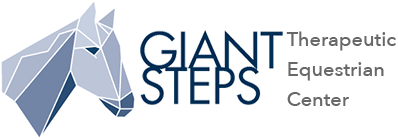Question of the Month: Caring for Our Geriatric Horses–what’s it take?
Do any of you have aging parents? If you have (or are) an aging parent, you know that appetites and body responses to food change. My mom got heavier; my dad got skinnier. The same is true for horses.
No surprise, our horses are not spring chickens. Most have had at least one career before arriving at Giant Steps; many have had multiple careers. The average age of our herd is about 20 years old, and with that comes some dietary changes. On the one hand, older horses do not absorb nutrients as easily as younger horses. On the other hand, our horses work primarily at the walk, and do not burn as many calories as they did in their previous careers. To monitor, the program staff regularly scores our horses on their body condition (as do our various visiting veterinarians). As needed, we supplement. And as needed, we reduce feed.
Some of the horse owners (for those who are owned versus donated to Giant Steps) specify the body weights and feeding practices they would like for their horses. With age, concerns of Cushing’s Disease and arthritis (soundness) are factors which dictate appropriate body weight. Excel, Katydid and Corky have Cushings disease, and therefore need to stay on the slim side. Shahara, recently recovering from laminitis, also needs to stay lean. Those with soundness issues, like Excel, have a specific exercise routine and ideal body weight to ease the stress put on their joints.
We also closely monitor our horses’ teeth, maintain their hooves, and continue to make sure they are current on all vaccines. In addition, we are grateful to Dr. Ashley McCaughan and Dr. Amy Powell for the complimentary care and body work they provide (acupuncture and chiropractic, respectively).
All of that said, if you ever have a concern about our horses’ conditions, please email Program Director Julie Larson.

